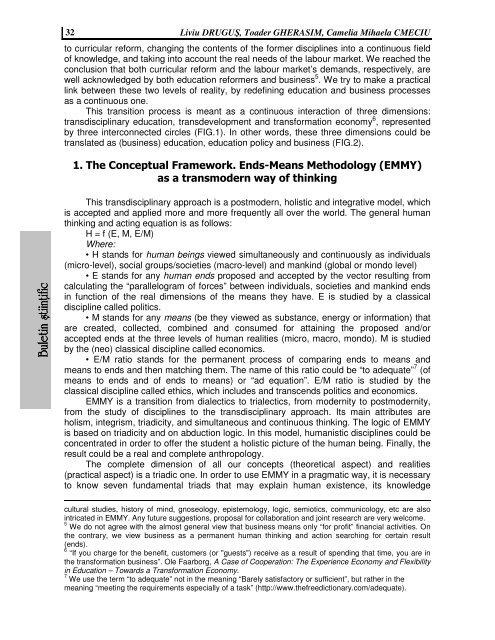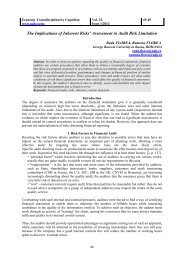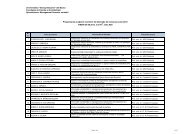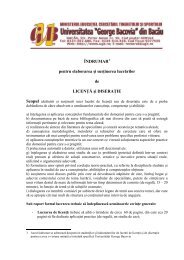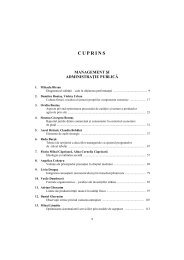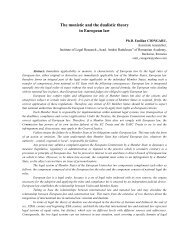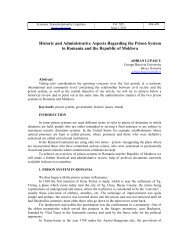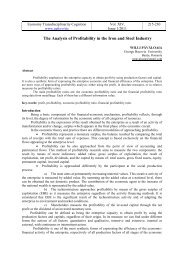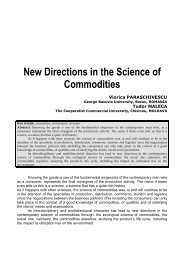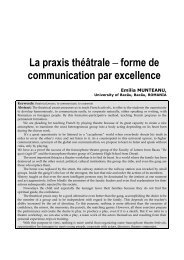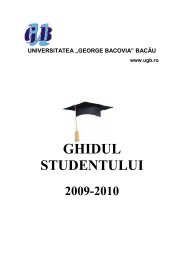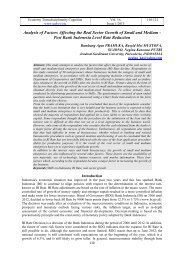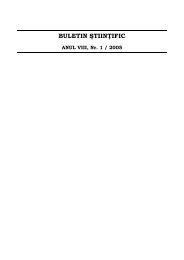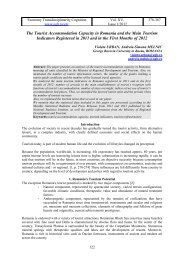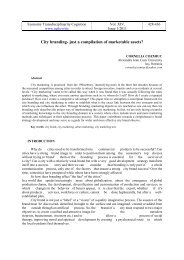BULETIN ÄTIIN IFIC - Universitatea George Bacovia
BULETIN ÄTIIN IFIC - Universitatea George Bacovia
BULETIN ÄTIIN IFIC - Universitatea George Bacovia
You also want an ePaper? Increase the reach of your titles
YUMPU automatically turns print PDFs into web optimized ePapers that Google loves.
32<br />
Liviu DRUGU, Toader GHERASIM, Camelia Mihaela CMECIU<br />
to curricular reform, changing the contents of the former disciplines into a continuous field<br />
of knowledge, and taking into account the real needs of the labour market. We reached the<br />
conclusion that both curricular reform and the labour market’s demands, respectively, are<br />
well acknowledged by both education reformers and business 5 . We try to make a practical<br />
link between these two levels of reality, by redefining education and business processes<br />
as a continuous one.<br />
This transition process is meant as a continuous interaction of three dimensions:<br />
transdisciplinary education, transdevelopment and transformation economy 6 , represented<br />
by three interconnected circles (FIG.1). In other words, these three dimensions could be<br />
translated as (business) education, education policy and business (FIG.2).<br />
<br />
<br />
<br />
<br />
!<br />
<br />
This transdisciplinary approach is a postmodern, holistic and integrative model, which<br />
is accepted and applied more and more frequently all over the world. The general human<br />
thinking and acting equation is as follows:<br />
H = f (E, M, E/M)<br />
Where:<br />
• H stands for human beings viewed simultaneously and continuously as individuals<br />
(micro-level), social groups/societies (macro-level) and mankind (global or mondo level)<br />
• E stands for any human ends proposed and accepted by the vector resulting from<br />
calculating the “parallelogram of forces” between individuals, societies and mankind ends<br />
in function of the real dimensions of the means they have. E is studied by a classical<br />
discipline called politics.<br />
• M stands for any means (be they viewed as substance, energy or information) that<br />
are created, collected, combined and consumed for attaining the proposed and/or<br />
accepted ends at the three levels of human realities (micro, macro, mondo). M is studied<br />
by the (neo) classical discipline called economics.<br />
• E/M ratio stands for the permanent process of comparing ends to means and<br />
means to ends and then matching them. The name of this ratio could be “to adequate” 7 (of<br />
means to ends and of ends to means) or “ad equation”. E/M ratio is studied by the<br />
classical discipline called ethics, which includes and transcends politics and economics.<br />
EMMY is a transition from dialectics to trialectics, from modernity to postmodernity,<br />
from the study of disciplines to the transdisciplinary approach. Its main attributes are<br />
holism, integrism, triadicity, and simultaneous and continuous thinking. The logic of EMMY<br />
is based on triadicity and on abduction logic. In this model, humanistic disciplines could be<br />
concentrated in order to offer the student a holistic picture of the human being. Finally, the<br />
result could be a real and complete anthropology.<br />
The complete dimension of all our concepts (theoretical aspect) and realities<br />
(practical aspect) is a triadic one. In order to use EMMY in a pragmatic way, it is necessary<br />
to know seven fundamental triads that may explain human existence, its knowledge<br />
cultural studies, history of mind, gnoseology, epistemology, logic, semiotics, communicology, etc are also<br />
intricated in EMMY. Any future suggestions, proposal for collaboration and joint research are very welcome.<br />
5 We do not agree with the almost general view that business means only “for profit” financial activities. On<br />
the contrary, we view business as a permanent human thinking and action searching for certain result<br />
(ends).<br />
6 “If you charge for the benefit, customers (or "guests") receive as a result of spending that time, you are in<br />
the transformation business”. Ole Faarborg, A Case of Cooperation: The Experience Economy and Flexibility<br />
in Education – Towards a Transformation Economy.<br />
7 We use the term “to adequate” not in the meaning “Barely satisfactory or sufficient”, but rather in the<br />
meaning “meeting the requirements especially of a task” (http://www.thefreedictionary.com/adequate).


